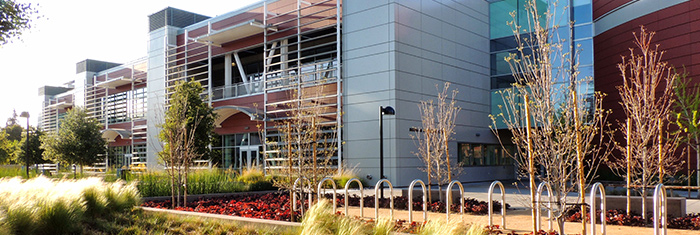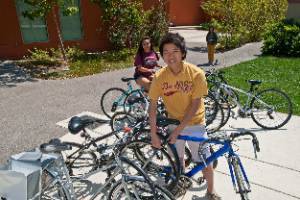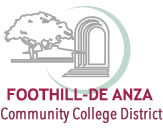The Position | District Overview | Foothill College | De Anza College | Commitment to Equity | Institutional Excellence and Innovation | District Budget | Expectations of the Chancellor | Opportunities and Challenges | Desired Attributes | Qualifications | Nominations and Applications
Expectations of the Chancellor

The chancellor of the Foothill-De Anza Community College District must provide strong, consistent and visionary leadership. As chief executive officer of the district, the chancellor supervises the college presidents; vice chancellors; executive directors of the Foothill-De Anza Foundation, International Student Programs, and Krause Center of Innovation; senior advisor to the chancellor for reimagining Foothill-De Anza; coordinator of communications and public affairs; and assistant to the chancellor.
Commitment to Access and Student Success and Willingness to Take Risks to Advance Student Success
At the direction of the Board of Trustees, the chancellor provides leadership to fulfill the district’s mission, responding to the changing demographics and needs of Silicon Valley by:
- Working with the presidents of Foothill and De Anza colleges in focusing on the colleges’ primary roles of teaching and learning, improving academic programs and providing for optimum student access and success consistent with resources
- Guiding an effective long-range planning process that is inclusive and ensures the highest quality of instruction, student services, community services, and overall management and administration within available resources
- Advancing the district’s commitment to equity and cultural pluralism through appropriate hiring policies, curriculum and program development, and affiliation with community organizations that can help the district fulfill its mission and further student success
- Developing and implementing innovative programs and opportunities that allow all staff to acquire knowledge and skills for professional growth
- In keeping with board priorities, building budgets that, regardless of fiscal conditions, increase investments in intentional strategies designed to achieve student success and equity goals and the elimination of systemic racism
- Supporting and working to improve shared governance processes and outcomes throughout the district in conjunction with faculty and classified senates and student governments as well as effective employer-employee relations in conjunction with the exclusive representatives of district employees
Ability to Create Lasting Change
Foothill-De Anza’s next chancellor will be part of a new leadership team engaged in reimagining what the district can and should be in the future. This a unique opportunity to work with the outstanding faculty, staff, administrators and students throughout the district to build a more student centered and equity minded district.
As a leader who values the contributions of all employees and students, the chancellor will:
- Cultivate and inspire a climate of cooperation between the colleges and Central Services by working with the presidents and vice chancellors to encourage collegiality and unity
- Prioritize strengthening and streamlining districtwide processes to remove barriers
to student access and
 success
success - Value collaborative problem solving as integral to the collegial consultation process and effective employee-employer relations
- Proactively support leadership training for administrators and supervisors and collective bargaining leadership to help create a more functional and respectful workplace environment for all employees
- Support the district’s commitment to participatory governance and the role of all constituents including faculty, administrators, classified staff and students. These constituents participate in the decision-making process and in the development of recommendations to the Board of Trustees
- Respect the role of the faculty in curriculum, academic and professional matters
- Appreciate and support the contributions of part-time faculty members and move the institution toward engaging them in ways that better address their material and professional needs and increase their capacity to fully participate as members of the academic community
A Strong, Broad, Strategic Vision for the District and Its Students, Reflected in External Partnerships
Through effective communication with and leadership in the community, the chancellor will:
- Articulate and promote a strong, innovative vision of the district to the educational, political, business and civic leaders of the community, the state and the nation
- Advocate for the educational and financial needs of the district and its students to local, state and federal government officials
- Strengthen existing ties and develop new sustainable partnerships with business, industry, local communities, other colleges and universities, K-12 schools and other entities
- Inspire community leaders and organizations to support and participate in district programs and services
- Work with the Foothill-De Anza Foundation to raise funds from the private sector, and inspire and motivate members of the community to assist in these efforts
- Encourage and enable Foothill-De Anza faculty, staff and administrative leaders to engage with the community in ways that will raise the profile of the district and its colleges in the community, help them stay informed about evolving community needs and expectations, and enhance their ability to respond effectively
Raise and Allocate Resources in Ways Aligned to Student Success
As chief executive officer of the district, the chancellor will:
- Manage the district’s resources with a keen understanding of how the colleges are funded to guide wise decisions when allocating scarce resources and developing multiyear analyses of policies and trends affecting revenues and expenses
- Strengthen the district’s financial position, anticipate fiscal uncertainties, and effectively guide the district during times of fiscal crisis to make sound and equitable student-centered decisions
- Develop new sources of external funding, promote income-generating ventures and partnerships with business and industry, and serve as an effective spokesperson for increased funding at the local, state and national levels
- Implement a revised budget allocation model that is student centered and equity minded
- Oversee district and college budgets and ensure input from representatives of all constituencies

Opportunities and Challenges
The new chancellor will lead the district through new opportunities and challenges over the next several years. How well the chancellor does in guiding the district as it acts to address those opportunities and challenges will almost certainly determine the new chancellor’s success.
Among the opportunities and challenges that are the most pressing are:
The Opportunity to Further Progress on the District’s Commitment to Equity
As noted, equity, diversity and inclusion are core values of the Foothill-De Anza Community College District. The Board of Trustees has adopted a set of Board Priorities that includes an explicit call for the development of “a shared understanding … regarding the need for ongoing institutional change and why it is imperative if we are to eliminate structural racism and achieve our equity and student success goals.”
The district recognizes that educational institutions in the United States have not fully served all students equitably and that systemic racism continues to harm students of color. For that reason, Foothill-De Anza identifies race as a significant factor in our equity work. Our aim is to identify barriers to success for students of color and other historically marginalized groups and eliminate them.
Foothill-De Anza also believes equity and diversity in employment is critical to enhancing student success. As a result, finding and retaining superbly skilled, highly talented and strongly committed employees who reflect the diversity of our student body is an imperative.
Foothill-De Anza’s new chancellor will need to champion the district’s commitment to equity and effectively lead ongoing institutional change that yields continued progress.
The Challenge of Strengthening Participatory Governance and Improving Labor Relations
Foothill-De Anza has a long history of meaningful participatory governance and collaborative labor relations it aspires to build upon. The new chancellor should bring thoughtful attention to existing systems, processes and procedures, some of which will require refinement or repair in order to improve communication, collaboration and overall effectiveness.
Foothill-De Anza’s new chancellor should effectively engage constituents, using good interpersonal skills to foster a working environment characterized by mutual respect and trust. The district seeks to increase collaboration with governance and labor groups and supports the development of an approach to labor relations that encourages problem solving and mutual gains. The chancellor will also need to be a skilled and confident practitioner of participatory governance and a genuine partner with faculty, staff, administrator and student representatives in working to improve processes and ensure good and timely participatory governance outcomes.
The Challenge of Identifying a Sustainable Financial Model and Opportunity to Identify and Secure New Sources of Revenue
In 2018-2019, California adopted a new method for allocating state funding to community colleges — called the Student Centered Funding Formula (SCFF) — that bases general apportionments on three amounts: a base allocation that largely reflects enrollment, a supplemental allocation based on the number of low-income students the district serves, and a student success allocation based on how well the district’s students do as reflected in several student outcome measures. Since the implementation of the SCFF, enrollments at many California community college districts, including Foothill-De Anza, have declined.
 Because of declining community college enrollments, current SCFF-determined funding
for many districts, including Foothill-De Anza, would be materially less than it is
now if the state used each district’s actual current enrollment to calculate its SCFF
funding. For that reason, the state put a “hold harmless” provision in place to provide
relief to districts like Foothill-De Anza where enrollments have yet to recover. For
the 2022-2023 fiscal year, that relief is estimated to be just over $7 million for
the district, representing approximately 1,450 full-time equivalent students. The
hold harmless provision is scheduled to last for three more years, through 2024-2025.
Because of declining community college enrollments, current SCFF-determined funding
for many districts, including Foothill-De Anza, would be materially less than it is
now if the state used each district’s actual current enrollment to calculate its SCFF
funding. For that reason, the state put a “hold harmless” provision in place to provide
relief to districts like Foothill-De Anza where enrollments have yet to recover. For
the 2022-2023 fiscal year, that relief is estimated to be just over $7 million for
the district, representing approximately 1,450 full-time equivalent students. The
hold harmless provision is scheduled to last for three more years, through 2024-2025.
While Foothill-De Anza receives the bulk of its funding from the state under the largely enrollment-driven SCFF, three of Foothill-De Anza’s closest neighbors — San Mateo, West Valley-Mission and San Jose-Evergreen — are “community-supported” districts that do not receive SCFF funding because they receive more money in local property taxes and enrollment fees than they would under the SCFF. Community-supported districts receive more revenue per student than Foothill-De Anza, and they are more insulated from the adverse financial consequences of any decline in enrollment. Foothill-De Anza, therefore, finds itself surrounded by districts that have more financial flexibility, and in some cases security. The new chancellor will need to understand this reality and be prepared to navigate enrollment and fiscal realities accordingly.
Over the last five to six years, nonresident student enrollment at Foothill and De Anza (consisting of international as well as out-of-state students) has fallen by nearly 60%. There has been a corresponding decline in revenue from nonresident tuition, which in 2018-2019 was more than $10 million higher than it is projected to be this year. The decline in nonresident tuition and other budget categories associated with restricted and categorical programs, self-sustaining programs, and others underscore a problem of growing strategic importance.
Foothill-De Anza’s new chancellor will need to bring knowledge, insight and expertise to the complex task of identifying a sustainable financial model for the district along with associated resource allocation methods aligned to student success. Among other things, that will require finding entrepreneurial ways to raise revenue to support strategies for improving student success, in part by fully employing the Foothill-De Anza Foundation as a strategic resource. Finally, the chancellor will need to build on Foothill-De Anza’s history of innovation and strong reputation to renew and expand relevant, high quality programs and services while identifying and securing new one-time and ongoing sources of revenue to support those initiatives.
The Opportunity to Move the District Toward a Reimagined Future
On top of addressing the major disruption caused by the pandemic, Foothill-De Anza is being challenged to respond to shifting demographics in its service area, growing income inequality in Silicon Valley, a demand for new and different approaches to preparing students for challenging and rewarding careers, and the growing realization that housing and food insecurity, along with mental health and well-being issues, are significant factors confronting many of our students and those who would normally be expected to become our students.
These realities mean the district needs to reimagine how its programs meet community needs, its approach to enrollment management and new enrollment innovations, the way it has historically operated and how that has created barriers to students over time, and how the district’s colleges will respond to the increasingly urgent requirement to address students’ basic needs.
Foothill-De Anza’s new chancellor will need to inspire creative thinking among faculty, staff, students and administrators regarding a reimagined future for the district and pursue timely and effective action to bring that future into existence.
Desired Attributes
In addition, the district seeks a leader with the following qualities, skills and characteristics:
- Demonstrated experience with and interest in supporting strong collaborations and shared goal setting across all organizational units of a multi-college district
- Demonstrated experience in creating and maintaining good working relations with faculty, classified and student senates; employee bargaining units; and a governing board
- Understanding of and respect for collective bargaining, with a commitment to mutual gains bargaining coupled with well-developed interpersonal skills that support productive working relationships between and among various constituents
- Ability to solve problems creatively, to make decisions in a fair and consistent manner, and to work in environments that are organizationally complex with differing points of view
- Strong evidence of being actively present and engaged with community and campus stakeholders and an established, strong advocate for the campuses they lead
- Evidence of nurturing and building leadership potential and capacity from their constituencies
- A deep knowledge of student success data and evidence of making data-informed decisions to improve success
- Demonstrated ability to communicate with regional employers and to pursue partnerships to meet future employer workforce needs
- Ability to steward existing donors and pursue new community partnerships
- Ability to work with the governing board and assist board members in their roles as policymakers, district spokespersons and representatives of the community
- Demonstrated skill in both strategic and operational planning and financial management
- Ability to champion the district to local, state and national legislators
Qualifications
Required
- An understanding of, sensitivity to and respect for the diverse academic, socioeconomic, ethnic, religious and cultural backgrounds, disability and sexual orientation of community college students, faculty and staff
- Master’s degree
- Experience working with a board of trustees or similar governing body such as a university or college board of governors or board of regents or a corporate or nonprofit board of directors
- Five to ten years of experience in progressively responsible positions in educational administration, including a minimum of three years at the executive level; comparable experience in business or nonprofit entities will be considered
Preferred
- Relevant advanced degree
- Teaching or student services experience at the secondary or post-secondary level
This website includes the following sections:
- Position Announcement
- Expectations of the Chancellor
- How to Apply
- Timeline
- Search Committee
- Search Updates
Printable search packet
How to Apply >
